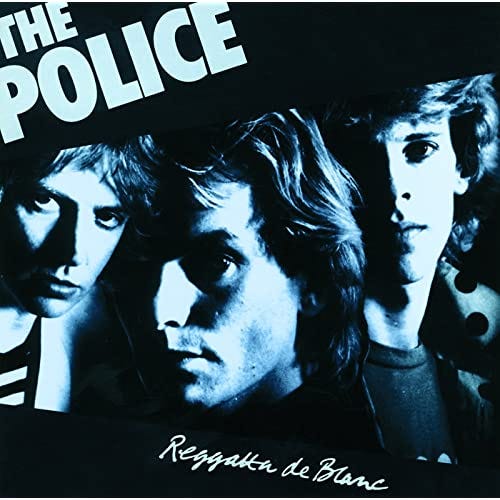The Police — Reggatta de Blanc
5.May.2020
The Police
Reggatta de Blanc
1979
This is a band that was built with the son of a CIA Agent (Stewart Copeland), the guy who lost the coin toss to play rhythm guitar in The Rolling Stones to Ronnie Wood (Andy Summers) and a jazz enthusiast/school teacher (Sting)…all managed by one of the spook's other sons — Miles Copeland. As unlikely a group of individuals as you can imagine.
Which may just be why it worked so well. In the span of six years, The Police recorded five albums as a band and went from touring in a Ford Econoline to being the biggest band in the world.
Reggatta de Blanc is the band's second album and, according to Google, loosely translated means “white people reggae.”
Outlandous d’Amour had generated some heat for the band because of the single “Roxanne”. It helped push the album to #6 in the UK and #23 in the US, their label, A&M Records was pretty hands-off. It also helped that the band wisely used the profits from the first record to record the second…labels will be very hands-off if you don’t cost them any money.
“Roxanne” would further be immortalized by Eddie Murphy in Walter Hill’s 1982 film 48 Hours.
The 11-month turn-around from the band’s first album, Outlandous d’Amour to Reggatta de Blanc meant the band had to rely on some of the songs from Sting’s previous band, Last Exit and even a song Stewart Copeland wrote in college “Does Everyone Stare”.
Because Reggatta de Blanc’s reliance on older songs and more democratic songwriting (the last album to do so) it combines the punk personality of Copeland and the jazzy and literary pretense of Sting.
On the song “Bring on the Night” — the title is taken from Ted Hughes’s poem “King of Carrion”, and is about Pontius Pilate; however, after reading The Executioner’s Song, Sting felt that the words fitted Gary Gilmore’s death wish, and says that since then, “I sing it with him (Gilmore) in mind.”
Only Sting could connect UK poet Ted Hughes and US serial killer Gary Gilmore.
The songwriting on Reggatta de Blanc, is pretty evenly split:
5 — Sting
3 — Copeland
2 — The Police
1 — Sting, Copeland
By way of comparison, on the next album Zenyatta Mondatta, the songwriting was split this way:
8 — Sting
1 — Copeland
1 — Summers
Also by way of comparison, Regatta de Blanc peaked at #15 on the US albums chart when released and Zenyatta Mondatta peaked at #5 on the US albums chart when released — cause and effect perhaps.
While I find these lists mostly silly and wildly subjective, Reggatta de Blanc pops up on many lists like “albums to listen to before you die” (rather grim) and once renowned rock magazines “Top 500 Albums.”
The album’s popularity has grown over time. For many fans of The Police, this is their favorite album, myself included…and in a piece for Modern Drummer magazine, Stewart Copeland chose Reggatta de Blanc as the best Police album.
Sometimes I think Sting's solo career overshadows exactly what it is that The Police accomplished. And it is A LOT. Back then to go from nothing to the biggest band in the world was done three ways, talent, work, and mettle. The Police had talent in abundance, did the work of four bands, and had the mettle do that work.
It’s on Reggatta de Blanc that The Police are most what Stewart and Miles Copeland originally had envisioned the band to be. Over the course of the next three albums (Zenyatta Mondatta, Ghost in the Machine and Synchronicity) Sting did become the dominant voice, for better or worse — depending on your point of view.
Regatta de Blanc is like that first piece of cake that’s hand-made before you realize the recipe has been sold it’s going to be mass-produced by Entenmann’s. Still good, it just looses some of the taste.




